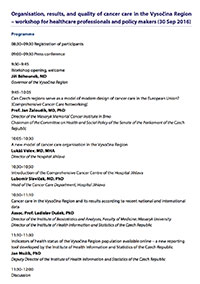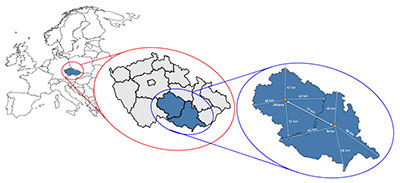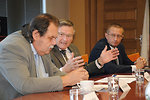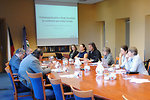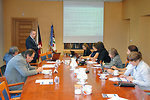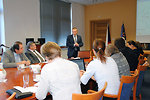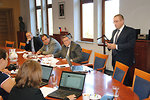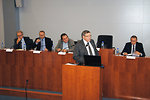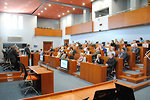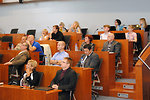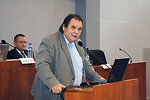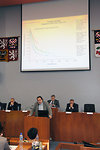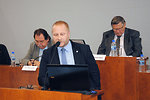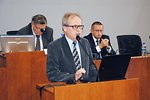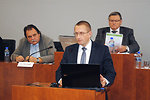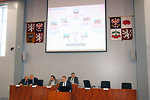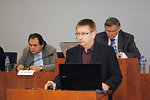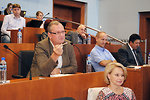Cancer care in the Vysočina Region is a good example for European countries
The Masaryk University cooperates with two administrative regions of the Czech Republic, the Vysočina Region and the South Moravian Region, in their endeavour to develop a pilot model of Comprehensive Cancer Care Network, which can serve as a model of effective cancer care management. On 30 September 2016, the town of Jihlava hosted a meeting of healthcare professionals, the aim of which was to present the results of cooperation among cancer care facilities in both regions, as well as principles of functioning of the pilot model, which has been launched only recently.
Cancer Control Joint Action (Cancon) is a joint European initiative aimed at cutting the cancer burden of the EU population. Work Package 6 (Integrated cancer control) involves the development of Comprehensive Cancer Care Networks (CCCN) [1]. Most European countries have already understood the necessity of availability of a well-functioning network of cancer care facilities, and are starting to prefer this alternative to former efforts to concentrate all cancer care into high-tech cancer centres. Strong arguments for this shift involve increasing incidence and prevalence of cancer patients, which is partly due to an ageing population of the EU, partly due to improvements in cancer care. The pilot model of a Comprehensive Cancer Care Network was formally launched on 30 September 2016 at a meeting of healthcare professionals hosted by Jiří Běhounek, MD, Governor of the Vysočina Region. Among others, the meeting was attended by representatives of the main Czech participants in the CanCon project: Lukáš Velev, MD, MHA (Director of Hospital Jihlava), Prof. Jan Žaloudík, MD, PhD (Director of the Masaryk Memorial Cancer Institute), and Assoc. Prof. Ladislav Dušek, PhD (Director of the Institute of Biostatistics and Analyses of the Masaryk University).
Comprehensive cancer centres in Europe and in the Czech Republic
workshop programme
(![]() PDF file, 90 kB)
PDF file, 90 kB)
Efforts to harmonise cancer care in European countries date back to November 2003, when a consultation on strategies to improve and strengthen cancer control programmes in Europe took place in the headquarters of WHO in Geneva [2]. Several different attempts to solve the issue of comprehensive cancer care have emerged since then. For example, a model of “superintegration” of cancer care and cancer research into a single centre was developed in Toulouse, France [3]. This model associates medical, technological, clinical, academic, research-oriented, pharmaceutical, public and private subjects, all of which have declared a common objective: fight against cancer. Six “big players” in European cancer research have opted for another solution, establishing the Cancer Core Europe project [4]. However, this model of “exclusiveness” does not address the structure and equity of cancer care in participating countries. From this point of view, the model of comprehensive cancer care networks, which was first mentioned by Prof. Lucio Luzzatto from the Istituto Toscano Tumori, seems to be the most reasonable solution [5].
Although first Cancer Centres in the Czech Republic were officially established in 2005, some regions still struggle to guarantee the desired quality and equity of cancer care. In many regions, the term “comprehensive cancer centre” only involves the largest regional hospital, which does not actually cooperate with regional cancer care providers. The Vysočina Region is one of few exceptions: an elaborate network of mutually cooperating hospitals has been systematically developed since 2005. On top of that, in terms of providing specialised cancer care, the Vysočina Region closely cooperates with the South Moravian Region. Earlier this year, cancer care providers in both regions made an agreement binding them to proceed according to uniform standards and protocols. Instead of mutual competition, these hospitals have established an effective cooperation. This way of organisation of cancer care in two neighbouring regions has become a pilot model for a Comprehensive Cancer Care Network (CCCN) [6]; developing such networks and ensuring their long-term sustainability are among targets of the European project CanCon.
Figure 1: Location of the Vysočina Region and the South Moravian Region in the Czech Republic (middle) and in Europe (left).
The cooperation among hospitals of the Vysočina and South Moravia Regions is coordinated by the Comprehensive Cancer Centre of Hospital Jihlava [7]. Five hospitals of the Vysočina Region are being involved in the first stage of the project and extensive collaboration with further 3 hospitals [8] (high volume centres of Brno city) has been initiated on the basis of key principles of the CCCN model. Standardisation of clinical procedures for cancer care is currently under way in these hospitals as the most principal step. Results of cancer care provided by these hospitals are expected to be “standardised” as well: in other words, no matter which hospital is chosen by a cancer patient, quality of the provided care will be equally high in all of them, and its results will be correspondingly good. And finally, outpatient specialists will be involved in the second stage of the project. Hospital Jihlava has particularly welcomed its cooperation with the Masaryk Memorial Cancer Institute [9] (Brno, Czech Republic), which is a specialised cancer centre with supraregional coverage.
Current achievements of cancer care in the Vysočina Region
The Vysočina Region already offers a fully-fledged infrastructure for modern cancer care. The new model of organisation of cancer care, which has recently become an example for the CanCon project, will ensure the availability of modern cancer care, interdisciplinary consultations of individual cases (i.e., individual approach to patients), high-quality care in the proximity of patients’ homes, quality control of cancer care across the region and, last but not least, strengthening the role of early diagnosis. The Vysočina Region has successfully implemented all recommended cancer screening programmes, and their regional coverage is very high when compared to other regions of the Czech Republic.
All of the above-mentioned parameters and outputs can be evaluated thanks to a uniform information system, which was developed in cooperation between the Masaryk University and the Czech Society for Oncology. Epidemiological burden and treatment burden can be evaluated on the basis of administrative data provided by hospitals, and data from the Czech National Cancer Registry: this includes the evaluation of treatment outcomes, benchmarking, etc. Effectiveness and safety of cancer screening programmes, as well as the coverage of target populations by these programmes, can be evaluated thanks to specialised databases and data provided by health care payers. Last but not least, specialised registries make it possible to monitor targeted therapies in selected cancer types. All of these data sources contribute to a complex and detailed insight into cancer care in the Vysočina Region, which has been actually presented on this workshop.
Dr Velev noted that even a relatively small region, such as the Vysočina Region, must be able to provide high-quality cancer care to all of its inhabitants in order to prevent the treatment-related migration to other regions. Cooperation of hospitals, based on the platform of a Comprehensive Cancer Care Network, offers a simple solution. Dr Velev also demonstrated several statistics showing the increasing treatment burden of Hospital Jihlava and the treatment-related migration of patients among regions.
Assoc. Prof. Dušek, who is an official representative of the Czech Republic in the CanCon project, presented detailed information on cancer epidemiology in the Vysočina Region, and highlighted very good results of the regional cancer care in comparison with other regions of the Czech Republic and with other European countries as well. Over the last two decades, 5-year survival rates in the Vysočina Region have dramatically increased in most cancer diagnoses. Population-based cancer screening programmes have definitely played a major role: these programmes are very well organised across the Vysočina Region, covering a large part of the target population. In this context, Dr Běhounek appealed to journalists and physicians to help raise public awareness of the importance of preventive check-ups, and thus indirectly contribute to further improvements in cancer care in the Vysočina Region.
Legislative and informational support for further improvements in healthcare
Effective use of available information and data sources is essential to develop comprehensive networks of healthcare in general, and to evaluate them subsequently. This is obviously related to political and legislative support, as explained Prof. Jan Žaloudík, Chairman of the Committee on Health and Social Policy of the Senate of the Parliament of the Czech Republic.
To finish the meeting, Dr Mužík from the Institute of Biostatistics and Analyses of the Masaryk University demonstrated a pilot version of the information system focused not only on cancer care, but also on a complex description of the healthcare system and the health status of the population in the Vysočina Region. This new project aims to provide data on the health status of the population and on healthcare in individual regions of the Czech Republic (CR). A new informational and analytical portal, entitled “Regional Reporting of the National Health Information System” [10], is the main output of the project. In its first version, the portal has been recently published for the Vysočina Region and for the City of Brno. The full version of the portal, which is under preparation, will be able to describe the health status of the CR population with relevant indicators; this will help to accomplish the main goal of the National Health 2020 Strategy: to improve the health status of the population, to influence and to decrease the incidence of preventable illnesses and premature deaths.
Future perspectives
The pilot model of the Comprehensive Cancer Care Network in the Vysočina Region and the South Moravian Region has been developed gradually. Earlier this year, the network was officially launched both contractually (i.e., agreements were signed) and factually (i.e., in terms of actually provided cancer care). In near future, functionality of the model will be evaluated, and its benefits and standardised procedures will be transferred to other regions not only in the Czech Republic, but also in other European countries. Although it only represents a tiny fraction of both area and population of the EU, the actual Comprehensive Cancer Care Network in the Vysočina Region and the South Moravian Region is highly likely to become an example for other member states of the EU. Even in the Czech Republic, this model represents a unique cooperation, which is a significant step forward when it comes to providing a really comprehensive cancer care, which will be available to the entire population of the region.
References
- Work package 06: Integrated cancer control. CanCon, 2016. Available from WWW: http://www.cancercontrol.eu/how-we-work/integrated-cancer-control
- Consultation on strategies to improve and strengthen cancer control programmes. World Health Organization, 20013. Available from WWW: http://www.who.int/cancer/nccp/europeanconsultation/en/
- Oncopole Toulouse. Available from WWW: http://www.oncopole-toulouse.com
- Cancer Core Europe. Available from WWW: http://www.cancercoreeurope.eu
- Balance between the centralisation and availability of cancer care: Institute of Biostatistics and Analyses develops the European model of a Comprehensive Cancer Care Network. onconet.cz, 4 May 2015. Available from WWW: http://www.onconet.cz/index-en.php?pg=news&aid=1023
- CCCN Pilot model set in the Czech Republic. CanCon, 26 May 2016. Available from WWW: http://www.cancercontrol.eu/news/84/26/CCCN-Pilot-model-set-in-the-Czech-Republic/d,news
- Hospital Jihlava, allowance organisation. Available from WWW: https://www.nemji.cz/
- University Hospital Brno. Available from WWW: http://www.fnbrno.cz
St. Anne’s University Hospital in Brno. Available from WWW: http://www.fnusa.cz
Masaryk Memorial Cancer Institute Available from WWW: http://www.mou.cz - Masaryk Memorial Cancer Institute Available from WWW: http://www.mou.cz
- Institute of Health Information and Statistics of the Czech Republic. Regional Reporting of the National Health Information System. Available from WWW: http://reporting.uzis.cz/
12. 10. 2016 IBA MU


